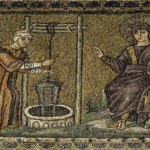We run our website the way we wished the whole internet worked: we provide high quality original content with no ads. We are funded solely by your direct support. Please consider supporting this project.

Jesus Refuted Old Testament Laws
Although it’s clear that Jesus regarded the Old Testament as the inspired word of God, he also directly challenged aspects of the Old Testament law. To illustrate, Jesus was repudiating Sabbath law when he defended his disciples’ harvesting of food on the Sabbath (Mt 12:1-14; cf. Ex. 34:21). Some scholars argue that the disciples were merely violating a Pharisaical tradition surrounding the Sabbath, not any actual OT law regarding the Sabbath. In this view, Jesus was trying to bring out the true meaning of Sabbath (i.e., showing that the Sabbath was made for humans, not humans for the Sabbath) and to demonstrate his authority as Lord of the Sabbath. While I grant that this was certainly part of Jesus’ intent, I do not see how this absolves his disciples from the charge of Sabbath-breaking. After all, according to the OT—not merely a Jewish tradition—people were to be executed merely for picking up sticks on the Sabbath (Nu 15:32-36). Moreover, Moses’ prohibition against doing work on the Sabbath explicitly included a prohibition on gathering food (i.e., manna) (Ex. 16:23-29). Hence, in this particular instance it seems the Pharisee’s had some biblical basis for their criticism of Jesus. Yes, the central intent of Jesus’ response was to bring out the true meaning of the Sabbath. But it appears its true meaning, as articulated by Jesus, stands in tension with certain meticulous and harsh laws surrounding the Sabbath in the OT. In the name of bringing out the true meaning of the Sabbath, it seems Jesus was perfectly willing to challenge these laws.
It’s worth noting that Jesus’ relaxed attitude toward certain meticulous and/or harsh laws surrounding the Sabbath as well as surrounding other matters was adopted and even expanded upon by his earliest disciples. Paul completely relativized the commandment to dedicate the seventh day of the week to God (Col. 2:16), for example. Similarly, we find early Christian leaders rejecting the OT commands for God’s covenant people, Jew and Gentile, to be circumcised, to eat particular kinds of foods, etc. Clearly, though the earliest Christian disciples regarded the OT as God’s Word, they subordinated its authority to the authority of Christ and were willing to reject parts of it when they felt the Spirit led them to do so (Ac.15:28, “it seemed good to the Holy Spirit and to us…”).
Along similar lines, it seems that Jesus functionally repudiated a law of the OT when he ingeniously prevented a woman caught in the act of adultery from being executed (Jn 8:1-11, Cf. Lev. 20:10; Deut 22:22). Jesus caught her (all male!) accusers in their self-righteousness by pointing out only people without sin are in a position to execute a sinner. Since all humans are sinners, the principle Jesus is illustrating in this episode would seem to apply not just to this particular accused sinner and this group of sinful accusers, but to all accused sinners and all sinful accusers. And this, in turn, renders it impossible to ever put into practice any of the OT’s commands to put people to death. Indeed, if followed through consistently, the principle that Jesus illustrates in this story challenges the moral justification, if not the apparent divine sanctioning, of all human-on-human killing in the Bible.
Jesus’ teachings, his death, and his resurrection radically and permanently altered the way that the early church interpreted the Old Testament. As Graeme Goldsworthy has argued, Jesus is “the goal and the fulfillment of the whole Old Testament” and is “the key to the Bible.” Therefore, everything about these laws is reinterpreted because Jesus is the center of God’s revelation, the one in whom the law is fulfilled (Matt 5:17-18).
Painting by Daniel Bonnell
Category: General
Tags: Cruciform Theology, Jesus, Old Testament
Topics: Biblical Interpretation
Related Reading

Is there Archeological Support for the Reliability of the Gospels?
One of the many tests historians typically submit documents to in accessing their historical reliability concerns the extent to which archeology supports or undermines the historic claims the document makes. So we need to investigate the extent to which archeology confirms, or refutes, aspects of the Gospels. Before we address this question, however, a preliminary…

Why a “Christocentric” View of God is Inadequate: God’s Self-Portrait, Part 5
I’m currently working through a series of blogs that will flesh out the theology of the ReKnew Manifesto, and I’m starting with our picture of God, since it is the foundation of everything else. So far I’ve established that Jesus is the one true portrait of God (See: Part 1, Part 2, Part 3, Part 4).…

The Bible is Infallible NOT Inerrant
While the cruciform understanding (explained here) of the “God-breathed” nature of Scripture is in tension with the way most talk about inerrancy (See previous post on inerrancy), I do not believe it is at all incompatible with what the Church has always sought to express by affirming the “infallibility” the Scripture. The core conviction is that Scripture will…

Redefining Transcendence
God is transcendent, which basically means that God is “other” than creation. The problem is that classical thinking about God’s “otherness” has been limited to what reason can discern about God. As a result, all that can be said about his transcendence is what God is not. We are thus unable to acquire a positive…

Why Believe the Virgin Birth Accounts?
Some skeptics claim that the story of the virgin birth of Jesus is derived from similar stories from pagan literature. While I won’t address here the details of the various parallels that some use to argue this point—as it has been demonstrated by many scholars that they simply don’t hold up to scrutiny—I will offer…

Jesus and the “Favored Nation”
Nationalism lies at the heart of the Old Testament narrative. This concept is intimately wrapped up with the law-oriented covenant God made with the Israelites at Mount Sinai, for at the heart of this covenant is the promise that obedience would bring national security while disobedience would bring national disaster (Deut. 27-28). What we shall…
